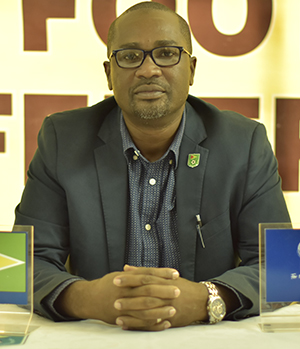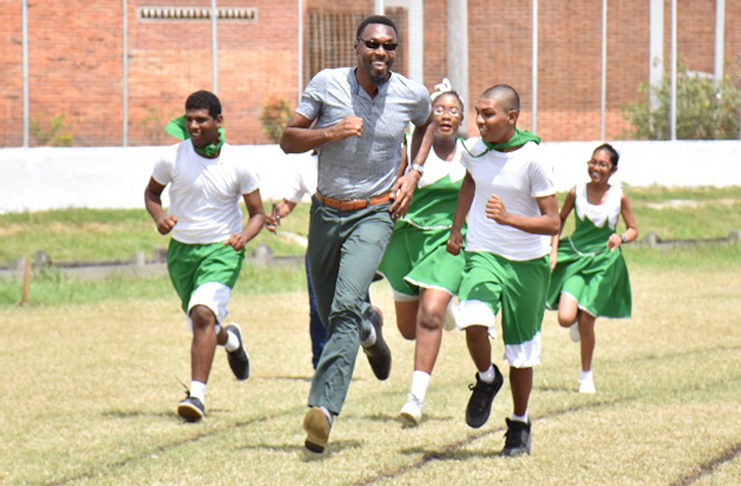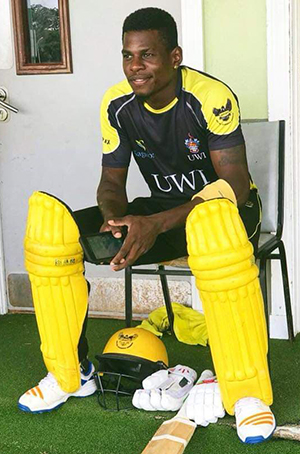THE growth of sports as a facet of development is an integral part of the Government’s mandate to provide a good life. Sports have a unique ability to bring people together and, for that reason, sport development in Guyana has been placed within the purview of the Ministry of the Presidency, Department of Social Cohesion, Culture, Youth and Sport.

It is the National Sports Commission, an auxiliary unit to that department that is responsible for the development of sports. It is given the mandate to promote the organisation of sports by all available methods, including by making grants available and by providing for the “establishment, erection and maintenance of sporting and other recreational facilities” through the National Sports Commission Act.
The Director of Sports, Mr. Christopher Jones, is tasked with executing the plans of the Commission and, since his assumption to office, he has been working to enhance the national sports portfolio by empowering the federations and organisations responsible for the development of the various disciplines of sport; developing community sporting grounds and bridging the gap between sports development on the Coast and in the Hinterland.
BRIDGING THE GAP BETWEEN THE COAST AND THE HINTERLAND
The Commission, through its Ground Enhancement Programme, has developed several community grounds by ensuring that they are up to playing and safety standards; are properly fenced and well lit.
Mr. Jones says that he recognises that, “throughout the country after sunset, there is no access to any playing space and that is the time when you will find your young people [becoming] idle”. That is one of the primary reasons for equipping the grounds with lights.

According to Mr. Jones, the Commission, through the programme, has acquired lights to the tune of $14 million, which it has started to install in 14 sporting grounds across all but two regions, which already had basic infrastructure in place and which are being further developed. “For the first time, communities like Aranaputa Valley in Region Nine has lights and it is the only space within that portion of the Rupununi that young people can access a playing ground beyond sundown,” Mr. Jones said. He noted too that the Commission has also partnered with the Lethem, Upper Takutu-Upper Essequibo (Region Nine) to outfit five grounds with lights.
While the Commission has been assiduously undertaking infrastructural upgrades, it has also been boosting capacity by providing technical support to groups through a cadre of trained coaches with responsibilities for different regions and others who share general tasks.

In Potaro-Siparuni (Region Eight), for example, boasts both an assigned football and a boxing coach who both train the youth assisted by coaches based in Georgetown, who are dedicated to building capacity in all the Regions.
Additionally, last year, the Department partnered with Archery Guyana and invited three persons from four hinterland regions: Barima-Waini (Region One), Cuyuni-Mazaruni (Region Seven), Potaro-Siparuni (Region Eight) and Upper Takutu-Upper Essequibo (Region Nine) to obtain international certification. Those persons are now conducting training sessions in their respective villages.

SPORT AS AN ELEMENT OF YOUTH DEVELOPMENT
The Director of Sports says that like academics, sports are also an integral part of developing the nation’s youth. “When you are speaking of youth development and you’re speaking about a rounded youth, you have to encompass and include sport… Many times, persons run away with youth development as only focusing on academics and not focusing on sports and, of course, the emphasis and the role that sport plays in health also,” he said.
Cricketer, Mr. Shaquille Williams agrees. He recently obtained a Bachelor’s degree in Banking and Finance from the University of the West Indies while on a cricket scholarship at the university. Mr. Williams is now an advocate for student athletes who believes that the development of sports needs to be done at the level of the formal school system, tertiary institutions and sporting clubs.
“My vision for a sports development curriculum would start with three places, the schools, the clubs and the university, which is the tertiary level education… You can have a sports programme encouraging them to pursue their studies while playing sports. I’m an advocate for student athletes; I’ve lived that life completing my studies being an athlete and just how I benefitted from it I want other persons to be a beneficiary as well,” he said.

SPORTS AND THE DIFFERENTLY ABLED
The Director of Sports also noted that persons who are differently abled have not been forgotten, as his office is collaborating with the Ministry of Education to include sports in the curriculum for schools for children who are physically challenged.
Since 2015, the National Sports Commission has organised a national sporting event for children with special needs. Last year, the event was held over two days to include additional sporting activities, such as swimming and indoor sports. The David Rose Special School placed first in that competition in 2018. Ms. Raynell Smith, a teacher at that school says that the activity brings out the hidden abilities in the children.
“I think it’s a good thing for them simply because they do not have to compete with children who do not have disabilities. When they are among themselves you get to see their real abilities, they do not feel demotivated and they compete because they are among children who have the same disabilities,” she said.
COLLABORATION AND CAPACITY BUILDING
Mr. Jones said that he has also been reaching out to the federations to see what assistance they may need to develop their disciplines regionally, nationally, and internationally.
“We have engaged them with the view of providing them with the necessary support that they would need, funding and otherwise, and we have been successful in 2018 in achieving this,” he said.
President of the Guyana Football Federation (GFF), Mr. Wayne Forde, expressed similar sentiments. He praised the Commission for the support that it has provided to help it execute its projects. “For specific international activities, we do reach out to the National Sports Commission and they have offered financial contributions… It has been a very engaging and supportive relationship and we’re doing everything from our side to grow that relationship,” he said.
With the inclusion of the differently abled, partnerships with the fraternities of the various disciplines, bridging the gap between the opportunities available to youth on the coast and in the far-flung regions is gradually being realised, in keeping with government policy to ensure the equitable distribution of resources countrywide.




.png)









